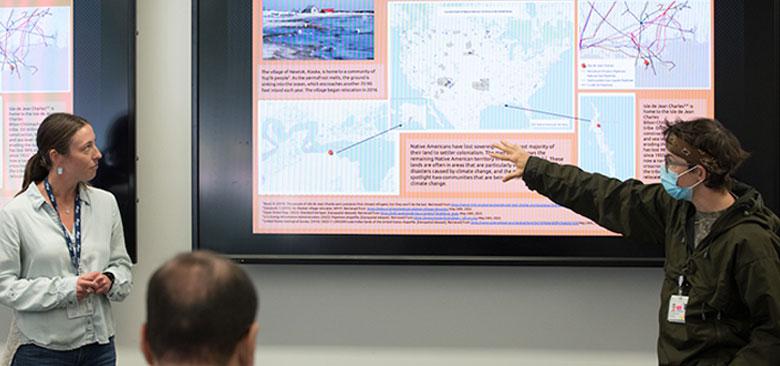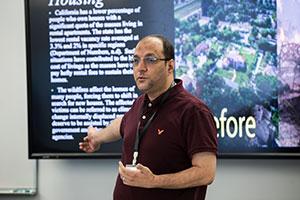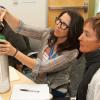
Alex Kowalewski, left, and Finn Black, right, discuss their team project in the "Climate Change, Health and Social Justice" course. (Elisabeth Fall Photography)
How to Prepare Nurses to Advance Health Equity Amid Climate Change
Orlando Harris, PhD, MPH, FNP, knows first-hand climate change’s impacts on health. As an HIV researcher who leads on-the-ground work in the Caribbean, he has seen how hurricanes have devastated that part of the world.
 Orlando Harris, PhD, MPH, FNP But the idea for creating a new course dedicated to the intersection of climate change and health came from nursing students.
Orlando Harris, PhD, MPH, FNP But the idea for creating a new course dedicated to the intersection of climate change and health came from nursing students.
“Our students are asking for more content on the impacts of climate change and other extreme weather events on health so they know how to best help their patients,” Harris said. “Climate change and global warming cause extreme weather events and impact air quality, water, food production, industry, economic and political stability. The impacts reach into every area of life.”
Harris, an assistant professor at the UCSF School of Nursing, professor Susan Chapman, PhD, MPH, RN, and doctoral student Ashley Moore MS, RN, have created the new course “Climate Change, Health and Social Justice” that focuses on climate change and how it impacts health, equity and social issues like environmental, economic and racial justice. Launched this past spring with support from a $4,000 UCSF Innovations Grant, the course is open to students in the School of Nursing as well as the schools of Dentistry, Medicine and Pharmacy.
Given climate change’s impact on health now and into the future, nurses and other medical professionals need to see the whole picture to properly treat patients, Chapman said.
“This is one of the major — if not the major — health policy and public health issue today,” said Chapman. “In the course, we show how all sorts of climate change events link to health, heath outcomes and inequities. There are impacts on vulnerable populations in terms of where they live, what they’re breathing and what they’re surrounded by.”
Leveraging Social Media to Build Awareness
Over 10 weeks this past spring quarter, students explored topics like climate change’s impacts on health, economics, vulnerable communities, tribal communities, environmental racism, urban renewal and infrastructure. They also examined the intersection of climate change on vulnerable women and children; how extreme weather impacts sexual and gender minority health; food, water and housing insecurity; political and corporate accountability in terms of climate change; and how climate change relates to violence and the police state.
 Talal Al Enazi presents his project in the "Climate Change, Health and Social Justice" course. Instead of having students write papers to present to the class, which keeps that work inside the classroom, students created public messages through infographics and videos that took their research and translated it into actionable messages for the general public through social media platforms like Instagram and Tik Tok.
Talal Al Enazi presents his project in the "Climate Change, Health and Social Justice" course. Instead of having students write papers to present to the class, which keeps that work inside the classroom, students created public messages through infographics and videos that took their research and translated it into actionable messages for the general public through social media platforms like Instagram and Tik Tok.
One student group made a video about how California wildfires impact the health of vulnerable populations and create climate refugees. Another addressed teen migrants coming through the U.S. southern border due to environmental disasters in their home countries.
Mariana Trujillo, RN, who is pursuing a master’s degree in health policy nursing, was part of a group that created an infographic about climate change and displacement of Native American communities. She said that the course expanded on what she already knew about climate change. “I never really understood the social justice aspect to it until I took this course,” she said.
The course also gave her better insight on policies behind climate change, she added. “The crisis is just getting worse, and this helped us learn the history of how we got here, and what we can possibly do about it,” she said.
It has also changed how she views nursing, especially when it comes to waste, and has caused her to question if many items need to be single use. Disposable gloves and masks make sense, but what about commodes? “We use so many resources for one commode in a patient’s room that we then get rid of,” Trujillo said.
Finn Black, RN, who is studying for a master’s degree in advanced public health master’s degree, was in the same student team as Trujillo and said they learned a great deal through the project. They also appreciated hearing from guest lecturers, like Native American activist Orlin Jones who talked about climate change as colonialism.
An Interprofessional Course
 Susan Chapman, PhD, MPH, RN For spring 2023, the course will be a requirement for all health policy and public health students at the School of Nursing. Opening it up to students beyond the School of Nursing is critical.
Susan Chapman, PhD, MPH, RN For spring 2023, the course will be a requirement for all health policy and public health students at the School of Nursing. Opening it up to students beyond the School of Nursing is critical.
“We’re all working together on these issues and maybe can come up with policy initiatives once we get to know each other and work better together,” Chapman said. “Everything we do in health care now is through a team approach. We’re going to need teams for this too.”
In addition to actively recruiting students from the UCSF schools of Dentistry, Medicine and Pharmacy, Harris is working with the UC Irvine School of Nursing to make this course available remotely to their students.
“Instead of other UCSF and UC schools copying what we’re doing, we’re building out the course so that it will be open to students campuswide and then beyond,” said Harris.



